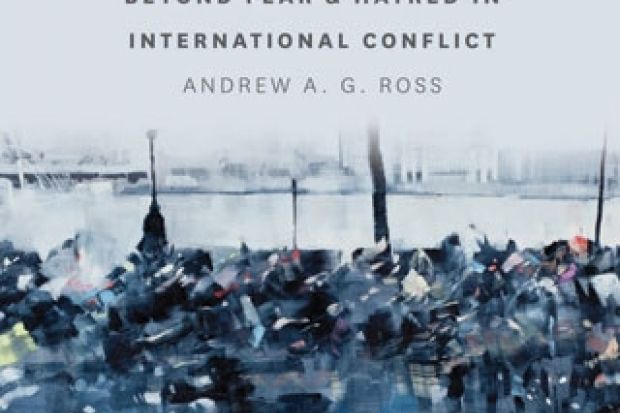When the planes slammed into the Twin Towers of the World Trade Center on 11 September 2001, everyone knows where they were. But, 12 years after the event, being able to pin down what precisely your emotional reaction was on that day might be trickier. How did those emotions feed into subsequent feelings and thoughts about United Nations-backed action in Afghanistan, the unsanctioned invasion of Iraq or the attacks in Madrid and London? Here, American political scientist Andrew Ross explores this theme in unexpected ways.
When significant things happen in world politics – and in this book the focus is the post-Cold War conflicts of the 1990s and the unprecedented terrorism and subsequent wars of the post-9/11 period – waves of variegated emotion are created, and may then have an impact on other contexts in unanticipated ways.
Ross names these waves “circulations of affect” – conscious and unconscious emotional interactions – in a key contribution to existing scholarship. His project, he says, is to develop an “alternative framework better suited to the affective intensity of global politics”.
He investigates, with some success, “the way social interactions intensify, harmonize, and blend the emotional responses” by focusing on “sites and types of emotional impact missed by research trained on identities, institutions, or interests”.
He also examines the significant and highly interesting cases of the episodes of war and genocide in the Balkans and Rwanda, and aspects of the affective impact on the US of the events of 9/11 and on Spain of the “11 de Marzo” bombing in 2004, arguing that the affective dimensions of these events have been overlooked.
A particular target of Mixed Emotions is the preponderance of troubling conceptualisations of what Ross describes – arguably incorrectly in these cases – as “ethnic conflict”; the widespread use of terms such as “ancient hatreds” is particularly concerning. He makes a case for the fluidity of the concept of ethnicity itself, and suggests, in a valuable interpretation, that the emotions that help to shape such identities are contingent on events rather than the result of fixed identities and conflicts.
His theorisation of emotion “as a creative source of collective agency” that can help us understand the direction of political events in the early 21st century is refreshing and positive, even though some may be troubled by his reference to genocide and nationalism as “creative forces” that capitalise on the “fugitivity” of political and economic struggles absorbed into cultural politics.
Ross’ examination of what he describes as the “neuropolitics of incitement” produces some of this book’s most insightful and interesting passages.
His analysis of political leaders’ use of ambiguity in incitement is important, although there is scope for greater focus on detail to pin down exactly how, for example, an infamous speech made just prior to the Rwanda genocide by Léon Mugesera, a Hutu politician, “contained enough literal material to crystallize fear, but not so much that it impaired the imaginative application of that fear to the most broadly conceived enemy”.
Where Ross does quote survey- and interview-based research, his case is most convincing, but generally that is not his methodological approach. His case studies on emotion in the US after 9/11, and in Spain after the 2004 bombing, and the stoking-up of nationalism in the former Yugoslavia, do not fully synthesise the key “facts” of those events with in-depth analysis of emotional waves in a way that can be methodologically nailed down.
That Ross is coming to these events some time after these circulations have long ago waned or transformed is an issue that needs to be tackled head on.
It could be that Ross’ aim of not looking for “fixed laws” or patterns but rather to “float synthetic, experimental, and contestable accounts of affective processes” is where this otherwise admirable and stimulating scholarship goes awry.
Mixed Emotions: Beyond Fear and Hatred in International Conflict
By Andrew A. G. Ross
University of Chicago Press, 232pp, £59.50 and £19.50
ISBN 9780226077390 and 7420
Published 10 January 2014
Register to continue
Why register?
- Registration is free and only takes a moment
- Once registered, you can read 3 articles a month
- Sign up for our newsletter
Subscribe
Or subscribe for unlimited access to:
- Unlimited access to news, views, insights & reviews
- Digital editions
- Digital access to THE’s university and college rankings analysis
Already registered or a current subscriber?





